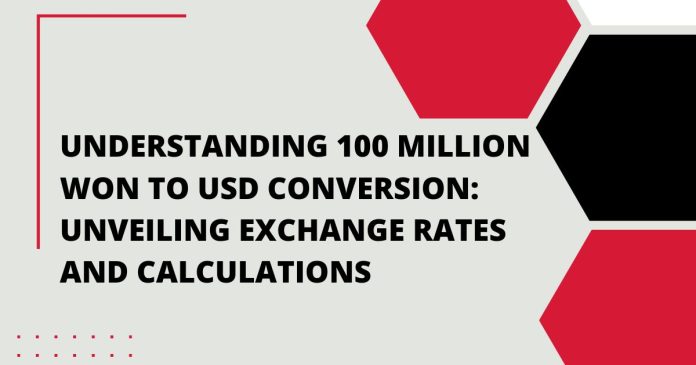Introduction
In a globalized world, understanding currency conversion is crucial, especially when dealing with large amounts. The exchange rate between different currencies can greatly impact financial transactions, investments, and international trade. One such conversion that often captures attention is converting 100 million Won to USD. In this article, we will delve into the process of converting this substantial sum and explore the factors influencing exchange rates.
The Basics of Currency Conversion
1. Why Currency Conversion Matters
Currency conversion involves converting one country’s currency into another at the prevailing exchange rate. It’s essential for international businesses, travelers, investors, and anyone engaged in cross-border financial activities.
2. Exchange Rates Explained
Exchange rates determine the value of one currency in relation to another. They are influenced by various economic factors, including interest rates, inflation, geopolitical events, and market sentiment.
Understanding 100 Million South Korean Won (KRW)
3. The Significance of 100 Million KRW
100 million KRW is a substantial amount in South Korea. It’s crucial to grasp its value before attempting to convert it into USD.
4. Factors Influencing KRW
The value of KRW is influenced by South Korea’s economic performance, trade balances, and government policies. These factors can cause fluctuations in its value against other currencies.
Converting 100 Million KRW to USD
5. Current Exchange Rate
To convert 100 million KRW to USD, we need the current exchange rate between the Korean Won and the US Dollar. Exchange rates are dynamic and change frequently due to the factors mentioned earlier.
6. Using the Exchange Rate for Conversion
Let’s assume the current exchange rate is 1 KRW = 0.00084 USD. Using this rate, 100 million KRW would be approximately 84,000 USD.
Factors Influencing Exchange Rates
7. Interest Rate Differentials
Differences in interest rates between countries affect their currencies’ value. Higher interest rates often attract foreign investments and lead to currency appreciation.
8. Economic Stability
Currencies of economically stable countries are more attractive to investors, leading to stronger exchange rates.
9. Political Stability
Geopolitical stability and effective governance can enhance investor confidence, positively impacting a currency’s value.
10. Market Speculation
Traders’ perceptions and expectations can lead to short-term fluctuations in exchange rates.
Exchange Rate Calculations
11. Calculating Conversion Amounts
To calculate conversions, multiply the amount in one currency by the exchange rate. This applies to any currency conversion, including 100 million KRW to USD.
Historical Trends
12. Historical Performance
Studying historical exchange rate trends can provide insights into potential future movements.
13. Impact of Events
Major events, such as economic crises or geopolitical developments, can lead to rapid currency value changes.
Conclusion
In a world characterized by international transactions, understanding currency conversions is paramount. Converting 100 million KRW to USD involves considering the current exchange rate, economic factors, and geopolitical stability. By comprehending these dynamics, individuals and businesses can make informed financial decisions.
Frequently Asked Questions (FAQs)
Q1: Can exchange rates be predicted with absolute certainty? A: No, while economic indicators provide insights, unforeseen events can lead to unexpected rate fluctuations.
Q2: How frequently do exchange rates change? A: Exchange rates can change every second due to the dynamic nature of global financial markets.
Q3: Are there fees associated with currency conversion? A: Yes, financial institutions may charge fees for currency conversion services.
Q4: Can I lock in an exchange rate for future transactions? A: Some services allow you to lock in a specific rate for a future date to mitigate potential rate fluctuations.
Q5: Where can I access real-time exchange rate information? A: Various financial news websites and currency converter apps provide up-to-date exchange rate data.

